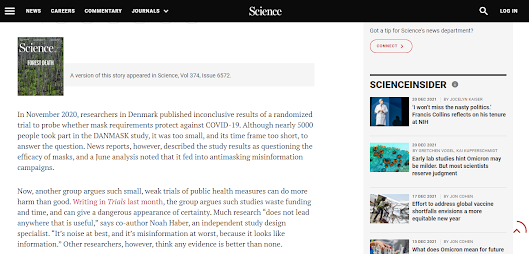‘It’s misinformation at worst.’ Weak health studies can do more harm than good, scientists say
"In November 2020, researchers in Denmark published inconclusive results of a randomized trial to probe whether mask requirements protect against COVID-19. Although nearly 5000 people took part in the DANMASK study, it was too small, and its time frame too short, to answer the question. News reports, however, described the study results as questioning the efficacy of masks, and a June analysis noted that it fed into antimasking misinformation campaigns.
Now, another group argues such small, weak trials of public health measures can do more harm than good. Writing in Trials last month, the group argues such studies waste funding and time, and can give a dangerous appearance of certainty. Much research “does not lead anywhere that is useful,” says co-author Noah Haber, an independent study design specialist. “It’s noise at best, and it’s misinformation at worst, because it looks like information.” Other researchers, however, think any evidence is better than none.
Henning Bundgaard, the lead DANMASK author, could not be reached for comment. However, in August in the Annals of Internal Medicine, Bundgaard and co-authors defended their sample size and methods, and said the study has been misinterpreted.
There’s little doubt that small, weak studies have proliferated during the pandemic, which raised pressure to test interventions fast. A February Nature Communications analysis of 686 clinical COVID-19 studies found they had poorer quality methods than a matched group of trials with similar study designs. A BMJ review last month of 72 studies found hand washing and wearing masks reduced risk of SARS-CoV-2 infection, but it also said most of the studies had moderate to serious weaknesses. And a study led by Haber, posted as a preprint in January, found that only one of 36 studies of COVID-19 policies met four criteria that would make results useful for policymakers, such as tracking outcomes for long enough that policy measures had time to influence local infection rates (...)"
Veja artigo em: https://www.science.org/content/article/it-s-misinformation-worst-weak-health-studies-can-do-more-harm-good-scientists-say




Comentários
Postar um comentário